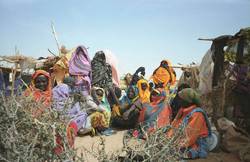Menu

Women, unrecognized casualties of war

- Refugee women from Darfur visited by Amnesty International delegates in a camp (Chad, 11/2003) © AI
ARCHIVAL: Women and War: reports of interest
"Stronger Women. Stronger Nations - 2008 Iraq Report"
In a report released on March 2, Women for Women International reviews the current situation of women in Iraq.
"It has been five years since the American invasion of Iraq and while the mistakes made there continue to accumulate still no-one has stopped to listen to what this critical mass of the population, women, have to say about solving the problems," said Zainab Salbi of Women for Women International.
The 34-page report compares women's opinions and situations from a survey in 2003 with new data from interviews with 1500 Iraqi women in 2007.
31 March 2005: Amnesty International Report on the Israel/Occupied Territories: Women carry the burden of conflict, occupation and patriarchy
"Palestinian women in the Occupied Territories bear the brunt of the conflict. They are victims of multiple violations resulting from Israel's policies and restrictions, and of a system of norms, traditions and laws which treat women as unequal members of Palestinian society..." Read full report
Women's lives and bodies -- unrecognized casualties of war
Report from Amnesty international, December 2004
Women and girls bear the brunt of armed conflicts fought today both as direct targets and as unrecognized "collateral damage". Lives Blown Apart a new report in Amnesty International's campaign, Stop Violence Against Women, calls for global action to challenge both the violence and the failure of governments to prevent it.…The report lays out the global picture revealing a systematic pattern of abuse repeating itself in conflicts all over the world from Colombia, Iraq, Sudan, Chechnya, Nepal to Afghanistan and in 30 other ongoing conflicts. Despite promises, treaties and legal mechanisms, governments have failed to protect women and girls from violence…
Other reports:
• "Women, War and Development"
"In today's world, 90% of war casualties are civilians, 80% of whom are women and children..." See http://www.iwda.org.au/publications/June2003.pdf
• Struggling To Survive: Barriers to Justice for Rape Victims in Rwanda September 2004
"Ten years after the 1994 genocide, many of the tens of thousands of Rwandan women who were victims of sexual violence have remained without legal redress or reparation. Perpetrators of the genocide employed sexual violence against women and girls as a brutally effective tool to humiliate and subjugate Tutsi and politically moderate Hutu. Grieving for lost family members and suffering physical and psychological consequences of the violence, women and girls who were victims of sexual violence are among the most devastated and disadvantaged of genocide survivors..."
Download Printer-friendly PDF file of this report (424 Kb, 60 pages)
• Shattered Lives: Sexual Violence during the Rwandan Genocide and its Aftermath Human Rights Watch/Africa. Copyright © September 1996 by Human Rights Watch.
"During the 1994 genocide, Rwandan women were subjected to sexual violence on a massive scale, perpetrated by members of the infamous Hutu militia groups known as the Interahamwe, by other civilians, and by soldiers of the Rwandan Armed Forces (Forces Armées Rwandaises, FAR), including the Presidential Guard. Administrative, military and political leaders at the national and local levels, as well as heads of militia, directed or encouraged both the killings and sexual violence to further their political goal: the destruction of the Tutsi as a group. They therefore bear responsibility for these abuses.
"Although the exact number of women raped will never be known, testimonies from survivors confirm that rape was extremely widespread and that thousands of women were individually raped, gang-raped, raped with objects such as sharpened sticks or gun barrels, held in sexual slavery (either collectively or through forced "marriage") or sexually mutilated. These crimes were frequently part of a pattern in which Tutsi women were raped after they had witnessed the torture and killings of their relatives and the destruction and looting of their homes. According to witnesses, many women were killed immediately after being raped.
"Other women managed to survive, only to be told that they were being allowed to live so that they would "die of sadness."
(full text at link above)

